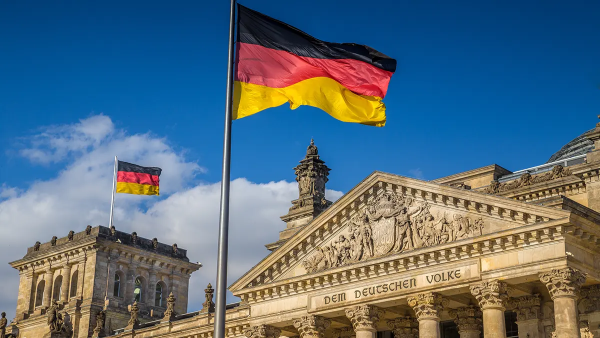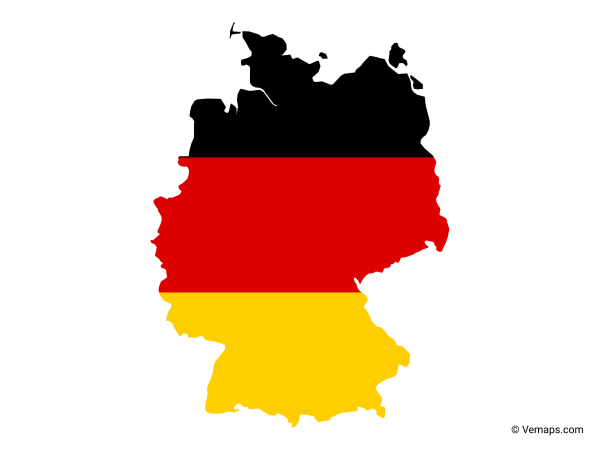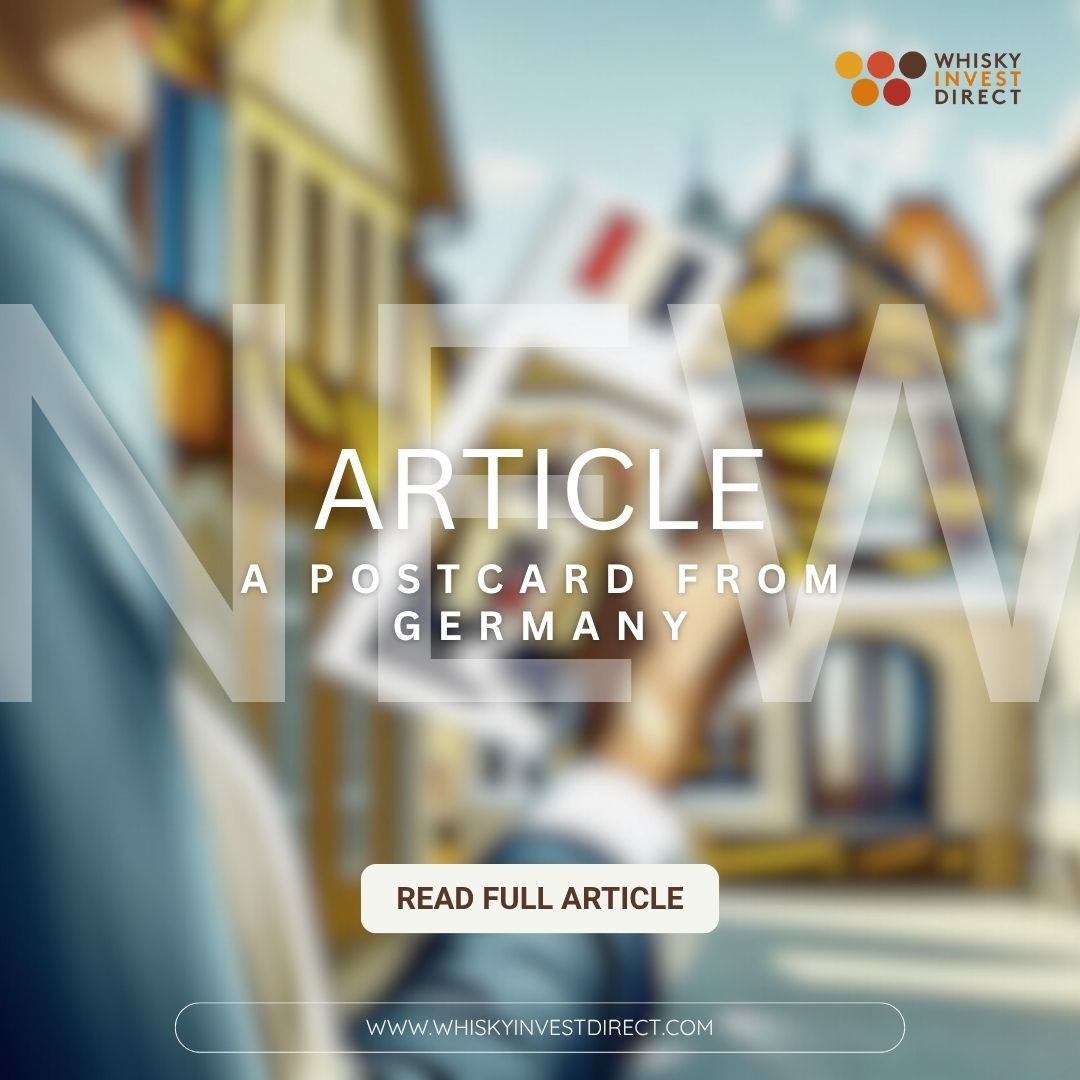A Postcard From Germany
Europe's biggest economy is struggling, and feeling particularly vulnerable to aggressive US tariffs. Consumer confidence in Germany is certainly fragile, but so far consumers are staying loyal to Scotch whisky, albeit at a discount, reports Tom Bruce-Gardyne …
Scotch whisky was doing rather well in Germany until recently, according to the drinks data specialists, the IWSR. While sales of vodka, rum and tequila were in gentle decline, Scotch was enjoying compound annual growth of 10% from 2018-2023. Together with Irish whiskey which grew 11% year on year, the pair were easily the best performing spirits.
Germany has long been a top ten export market for Scotch whisky, and was worth a record £201 million in 2022. Of that, single malts accounted for £113m and bottled blends £76m, but by 2024, shipments had slumped to £169m, pushing the country into 8th place behind Spain in the export charts. Within that total, blended Scotch held steady at £75m, while malts slipped to £81m.
So much for statistics. The mood is definitely sombre right now. "The economic forecast for this year is zero," says Julien Hemard, head of Pernod Ricard Europe. "With no growth in GDP for Germany, it is a very challenging time. When people have no confidence in the future, they tend not to want to spend and go out and party."
His top-selling Scotch brand – Ballantine's "has been doing OK," he told me. "But I wouldn't say it's our top priority. Germany is more known for American whiskey, and it's also a very strong Irish whiskey market, Jameson's has been doing very well."
Resident whisky expert Benhard Schäfer puts the Irish success down to the network of Irish pubs which sprang up 25 years ago. "In Nuremburg, I think there are at least ten," he says of his hometown where he runs the country's oldest whisky club, and is editor-in-chief for ‘Der Whisky Botschafter' magazine.

"We are also a strong market for American whiskey, especially in southern Germany," he says. "Basically, that goes back to the occupation after the war. Where I live in Bavaria, we had American soldiers based here. It's still the case that if you go into a bar and ask for a whisky and coke, in 99 out of 100 cases you'll be given an American whiskey. If you do that in northern Germany, in Hanover or Hamburg where there were more British troops, it's highly likely you'd get Scotch whisky and coke."
At present, he says: "What we have in Germany, like in all developed markets, is the middle price segment losing out. The high-end is basically stable and the cheapest segment is going up."
In 2023, sales of ‘regular' blended Scotch grew by a whopping 57% according to the IWSR. Above that tier, ‘premium' blends were up by 25%, ‘super-premium' by 9% and ‘ultra-premium' by 12%, while single malts declined by 7%. In terms of shipments, malts overtook bottled blends a decade ago by value, but by volume the latter still dominates on 39m bottles versus 8m for malts in 2024.
And yet, Bernhard insists: "There is no real activity in our market for blends. There is occasional advertising, but all the education that has been done over the years is always about single malts. There are no brand ambassadors for blended whisky."
Germans who are into Scotch often have incredible expertise. Many have toured Scotland, bagging distilleries as other bag Munro's, and there are tales, no doubt apocryphal, of managers being pinned to their stills and tortured with arcane questions. There is a real thirst for knowledge and a genuine affection for the Highlands and Islands.
At last year's Euros in Germany, Scottish fans made "a really good impression," he says. "There was a party in Munich, and everyone was happy the Scots were there with their kilts and pipes. How much this helped Scotch is hard to say, but it wouldn't have harmed it."

A spokesman for Jack Daniel's talks of seeing a high level of insolvencies and job-cuts especially among auto-workers. America is Germany's most valuable export market and is especially important for the car industry. Up to 90,000 BMWs, Mercedes, Audis and the like are said to be trapped in US ports, following Trump's threatened 50% tariffs on the EU.
The clock is ticking towards next week's supposed deadline of July 9th, but as I write there is no sign of a deal. US tariffs on most EU goods may settle at 10%, but whether that will include cars remains to be seen.
Either way "this leads to general uncertainty, a negative consumer climate and high saving rates," says the man from Jack Daniel's. "Consumers are simply not in the mood to spend their money on things that are felt to be just nice to have. In this environment, competition gets more intense, both amongst retailers and manufacturers. The promo share in spirits is increasing and consumers buy more and more on discount."
In Lidl, Germans can buy Queen Margot blended Scotch for as little as €8.29 (£7.11), largely thanks to alcohol tax being the equivalent of £3.13 a bottle, compared to the eye-popping £9.18 charged by our HMRC. Malts start with Lidl's own-label Ben Bracken, currently discounted to €15, from €18, while, among brands, the store is offering Laphroaig Oak Select at just €27 – 20% off the usual €34 in Germany.
If the industry can avoid a price war and properly invests in its brands like Glenmorangie, its future in Germany may be OK. "I don't see sales rising, but with luck they may stay about the same," says Bernhard. "Scotch whisky won't collapse because it has a strong and confident fan base."

Award-winning drinks columnist and author Tom Bruce-Gardyne began his career in the wine trade, managing exports for a major Sicilian producer. Now freelance for 20 years, Tom has been a weekly columnist for The Herald and his books include The Scotch Whisky Book and most recently Scotch Whisky Treasures.
You can read more comment and analysis on the Scotch whisky industry by clicking on Whisky News.
